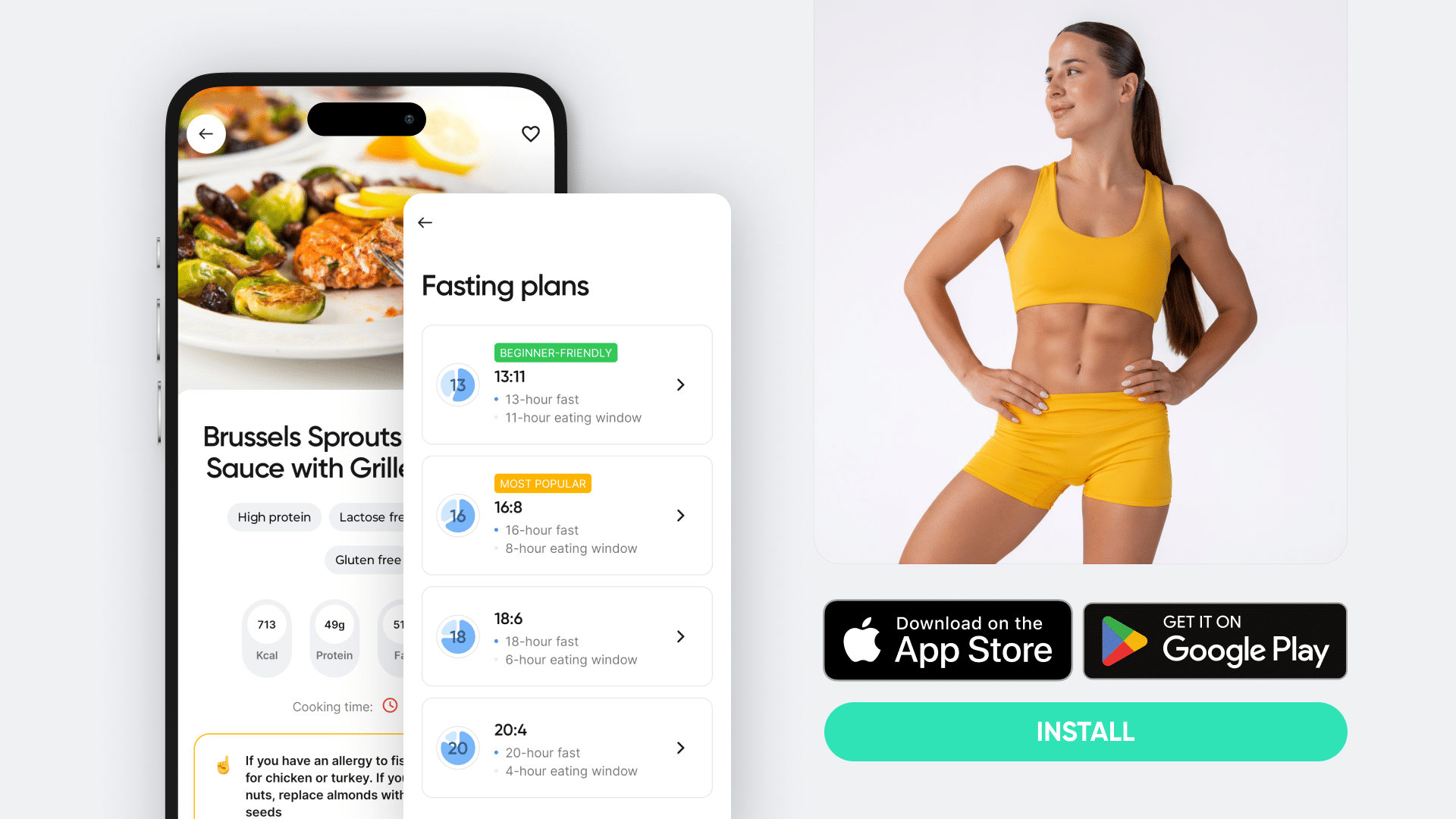Fasting is a practice that has been part of the human experience for a very long time. Today, people all over the world abstain from food and drink (or both) for health, ritualistic, religious, or ethical reasons.
The practice of fasting for weight loss has gained popularity in the last decade or so. While short fasts are quite popular, longer or prolonged fasts have started gaining more attention with people wondering if they may be better.
Fasting for three days is one such example of prolonged fasting. If you’re curious to know what a three-day fast is or what the weight loss effects, benefits, and dangers of fasting for three days are, then you should read on.
What Is a 3-Day Fast?
Also known as a water fast, it is the practice of liquid fasting for three days. People who participate in a water fast abstain from eating anything for the duration of the fast. They also don’t consume any calories from drinks other than water for 72 hours (1).
While liquid fasting for three days is relatively common, some people choose to extend this period to five or even 40 days, typically under medical supervision. (2).
Extended fasts cause the body to start breaking down muscle in an effort to get enough protein to keep you alive, as after seven days, your body’s fatty acid reserves will be gone.
With time, vital organs such as the heart, liver, and kidneys start to lose function, and eventually, the chance of death increases exponentially (3).
Lean and toned up body isn’t just a far-fetched fantasy. Check out the BetterMe app and watch it propel your weight loss journey into high gear!
What Are the Benefits of Fasting for 3 Days?
There may be some benefits, but it should be noted that most available research on the benefits of water fasting has been conducted on animals and not humans. The benefits of a fasting diet for three days can include:
May lead to autophagy
A review from 2018 suggested that both fasting and calorie restriction may promote autophagy (4).
Autophagy (meaning self-eating) is a process where the body breaks down old cells to reuse and repurpose as new cells. It is a recycling system that cleans out damaged parts of a cell (or the whole cell) to make newer healthier cells that work more effectively.
Some animal studies have suggested that without this process, the risk of cancer, neurodegeneration, muscle and heart disease, and infectious diseases can be higher and faster aging can occur (5). Autophagy also controls inflammation, so it may improve the outlook for people with infectious and neurodegenerative diseases, although more research is required(6).
This process has also been found to be quite beneficial for the liver. Autophagy is implicated in numerous liver functions and, according to emerging research, may play a role in mitigating the risk of several liver conditions, including Wilson’s disease, acute liver injury, non-alcoholic fatty liver disease, and chronic alcohol-related liver disease. (7).
May improve insulin and leptin sensitivity
Leptin is your body’s satiety hormone. This hormone reduces your appetite and makes you feel full. At the same time, insulin helps regulate blood sugar levels and excess glucose for energy to be used by the body.
According to two studies from the Clinical Nutrition journal and the American Journal of Physiology-Endocrinology and Metabolism, fasting makes the body more sensitive to these two hormones (8, 9).
Increased sensitivity means both leptin and insulin work better in their respective functions in the body. More satiety means you will eat fewer calories throughout the day, while better blood sugar control means the body stores less fat, meaning less weight gain.
May lower the risk of chronic diseases
As mentioned above, prolonged fasting triggers autophagy, which lowers the risk of chronic illnesses such as heart disease and cancer.
An older study published in the Cell Metabolism journal also showed intermittent or periodic fasting in rodents helps protect them against diabetes, several types of cancer, heart disease, and neurodegeneration.
In humans, abstaining from food can help reduce the risk of obesity, hypertension, asthma, and rheumatoid arthritis (10).
Another recent study (2022) showed that prolonged fasting can reduce oxidative damage and inflammation. Oxidative damage not only damages cells, proteins, and DNA, it also causes inflammation, which increases the risk of chronic illnesses (11).
Read more: Green Tea Intermittent Fasting: Benefits and Side Effects
May increase the levels of ‘good’ cholesterol and reduce triglycerides
A randomized controlled trial on 30 healthy individuals found one-day fasting to increase high-density lipoprotein (HDL) cholesterol levels and decrease triglycerides and weight. This one-day water fast also increased the levels of the human growth hormone, hemoglobin, and red blood cell count (12).
‘Good’ cholesterol helps maintain normal cholesterol levels in the body by absorbing the excess and taking it to the liver where it’s then flushed out. The higher the ‘good’ cholesterol levels in the body are, the lower the risk of heart disease and stroke will be (13).
Too many triglycerides in the body can harden the arteries or thicken their walls, thereby increasing the risk of stroke, heart attack, and heart disease.
If these levels continue rising unchecked, this can lead to acute pancreatitis, lipemia retinalis, multifactorial chylomicronemia syndrome, and damaged skin on the back, chest, arms, and legs (14).
May help lower blood pressure
Clinically supervised water fasts that last for up to two weeks have been linked to lower blood pressure (15). This is further associated with the fact that you drink more water and don’t consume salt when on a water fast.
However, it should be noted that fasting for three days is unlikely to help lower blood pressure as this is only possible on longer, medically supervised fasts.
May help ease cancer treatment side effects
As mentioned above, preliminary research has suggested that short-term and prolonged fasting may help reduce the risk of cancer.
However, in people already suffering from and undergoing treatment for this illness, research has shown that prolonged fasting may increase the efficacy of cancer treatment, prevent resistance acquisition, and reduce the side effects of chemotherapy (16).
How Much Weight Can You Lose Fasting for 3 Days?
Not much. In fact, you won’t lose any excess fat after a three-day fast.
Many people who are looking to shed a few extra pounds may look at this as a quick shortcut. Unfortunately, this is not one of the many potential health benefits of fasting for three days.
When you step onto a scale after abstaining from food and surviving on water for 72 hours, the number you see will be lower than it was three days earlier. However, this is neither a cause for celebration nor proof that such a diet can help with weight loss.
Research on prolonged fasting has shown that any weight loss during this time is generally from water, carbs, and even a small amount of muscle mass, but not body fat (17). If you want to lose weight, you need patience and certainly more than three days.
For long-term, sustainable results, you’ll need to reduce your calorie intake, eat healthy nutritious meals, work out using both cardio and strength training, and stay consistent over time.
Is a 3-Day Fast Enough for Autophagy?
If autophagy is your goal, a three-day fast is actually too long. However, there is a lack of human research on autophagy, but if it’s something you’re looking to try, animal studies suggest autophagy may start between 24 and 48 hours, or possibly after just 12 hours. (18).
Looking for a way to break the vicious cycle of weight loss and tone up all the jiggly parts? Watch the extra pounds fly off and your muscles firm up with the BetterMe app!
What Is the Difference Between Intermittent Fasting and Fasting for 3 Days?
Intermittent fasting is an eating practice that involves periods of fasting and eating. With intermittent fasting (IF), you go through extended periods of fasting and have a few short hours (aka the feeding window) when you can eat (19). The most popular forms of IF include (20):
- Fasting for 16 hours with an eight-hour eating window. This ranks first on the list of most popular IF methods.
- Fasting for 12 hours with a 12-hour feeding window.
- The 5:2 diet. This is slightly different from all the other IF eating patterns. You consume food normally for five days a week and reduce your caloric intake to 600 calories (men) or 500 calories (women) for two days a week.
- The 24-hour fast, aka the eat-stop-eat diet, means fasting completely for one or two days a week.
A three-day fast has no feeding or fasting windows. You simply don’t eat anything for a full 72 hours. Apart from plain water, all drinks are forbidden.
What Are the Side Effects of Fasting for 3 Days?
Despite the aforementioned benefits of fasting for three days, this diet has several downsides and risks that anyone who is considering trying it needs to be aware of. The dangers of fasting for three days include:
Malnutrition
Also known as nutritional deficiencies, malnutrition occurs when your body doesn’t absorb nutrients or get enough nutrients from food to function properly.
Signs of malnutrition include unexplained fatigue, dry and brittle hair, damaged nails, an unusually pale or swollen tongue, chronic diarrhea, mood swings, and lack of appetite (21).
These nutrient deficiencies can lead to a variety of health problems, such as digestion problems, skin disorders, stunted or defective bone growth, and dementia.
It won’t lead to fat loss
While some people do this diet for the potential health benefits, many are attracted to fasting for three days as a way of losing weight. However, as previously mentioned, most of the weight loss is water weight and not fat loss.
Older research suggests that longer fasts (more than a week to a month) can lead to an average of 0.9 kg of weight loss per day at first and approximately 0.3 kg by the third week (22). However, this weight loss is most likely due to the loss of water weight and muscle mass.
May lead to dehydration
Many people assume that water fasting means you will remain well hydrated throughout. However, many people tend to forget that 20% to 30% of our daily water intake comes from food (23).
Therefore, if you don’t increase the amount of water you drink during the fasting period, you’ll end up dehydrated.
May lead to dizziness when standing up
This is also known as orthostatic hypotension and is the result of an unsafe and sudden fall in blood pressure that occurs when you stand up quickly.
In addition to dehydration, this condition can be caused by anemia, heart conditions, long-term bed rest, blood pressure medications, and nervous system disorders (24).
Hyponatremia
Also known as water intoxication, this is a condition that occurs when the level of sodium in the blood is too low. Salt is lost through sweat and this is why working out is discouraged while you’re doing a water fast.
Binge eating disorder
This is a serious eating disorder that causes a person to regularly consume unusually large amounts of food and feel as if they cannot stop eating.
Binge eating disorder can affect people who are fasting or who have undergone a very low-calorie diet plan. One five-year study from 2010 revealed that prolonged fasts – those that last for longer than 24 hours – increased the risk of binge eating (25).
Sleep Disturbances
Some research has also found that individuals can experience sleep disturbances as a result of fasting, but overall the research is mixed (26, 27).
Who Should NOT Try a Fasting Diet for 3 Days?
While fasting for three days is relatively safe for the majority of people, it can be quite dangerous for some people, including (28):
- Patients with diabetes, as it can lead to dangerous dips and spikes in blood sugar.
- Pregnant women, new moms, or women who are breastfeeding.
- Anyone who is ill, taking medication, or suffers from uncontrollable migraines.
- Older adults, children, or teenagers.
- People with heart problems.
- People with eating disorders. As mentioned above, fasting has been linked to an increased risk of binge eating and bulimic pathology (11). The risk of triggering such disorders becomes worse for anyone who has an existing eating disorder.
- Active individuals whose needs are greater than the general, sedentary population.
What Can You Expect When Fasting for 3 Days?
Fasting for long periods can result in vitamin and mineral deficiencies, muscle breakdown, and diarrhea.
Denying your body food for 72 hours can lead to dizziness, headaches, low blood sugar, muscle aches, weakness, and fatigue.
Anyone who fasts for longer than this may experience anemia, a weakened immune system, liver and kidney problems, and an irregular heartbeat.
Read more: Intermittent Fasting and Running: A Winning Combination or a Terrible Mistake?
What Are Some Healthier Alternatives to Fasting for 3 Days?
Fasting for three days may be a relatively safe practice for some, but it is still an extreme and high-risk option for improving health or losing weight. Instead of doing this, you could choose an alternative route such as:
- Go on a calorie deficit – Not only is this the main answer to weight loss, it can also help lower cholesterol and reduce inflammation (29).
- Try intermittent fasting – As mentioned above, if you really want to try fasting, this is a much less extreme way to fast, in terms of both health benefits and weight loss. With this option, you go through a continuous cycle of eating and stopping rather than not eating and only consuming water for three days. However, intermittent fasting is not a suitable choice for everyone. It’s a good idea to work with a registered dietitian to determine the best approach for you.
- Eat a healthy diet and exercise – Many health problems can be solved by making minor but impactful changes to your diet and increasing physical activity
FAQs
Is It Healthy to Fast for 3 Days?
No, it is not.
While the practice is considered to be relatively safe and has some health benefits, almost all of these benefits can be achieved by fasting for just 12 hours a day (or 24 hours at most).
Do People Have Stomach Pain When Fasting for 3 Days?
Yes, they often do.
If you experience abdominal pain during a fast, this means you should stop immediately. Some other symptoms that tell you to suddenly end your fast include dizziness, nausea, loss of consciousness, vomiting, chest pain, and diarrhea (10).
What Happens After 3 Days of Fasting?
After three days of not eating, you will most likely be very hungry, dizzy, weak, fatigued, and experiencing muscle aches and a headache.
How Many Days Is It OK to Fast?
It is advisable to go no longer than 24 hours without food.
The Bottom Line
While a three-day fast may seem like a good option for improving your health and losing weight, it really isn’t worth it. It’s an incredibly unhealthy and potentially fatal way of trying to improve your life.
Rather than fasting for three days, you could try intermittent fasting or other more sustainable approaches to improving your lifestyle. You should always consult your doctor or registered dietitian before you make any drastic changes to your diet, particularly if you have any underlying conditions or chronic illnesses.
DISCLAIMER:
This article is intended for general informational purposes only and does not serve to address individual circumstances. It is not a substitute for professional advice or help and should not be relied on for making any kind of decision-making. Any action taken as a direct or indirect result of the information in this article is entirely at your own risk and is your sole responsibility.
BetterMe, its content staff, and its medical advisors accept no responsibility for inaccuracies, errors, misstatements, inconsistencies, or omissions and specifically disclaim any liability, loss or risk, personal, professional or otherwise, which may be incurred as a consequence, directly or indirectly, of the use and/or application of any content.
You should always seek the advice of your physician or other qualified health provider with any questions you may have regarding a medical condition or your specific situation. Never disregard professional medical advice or delay seeking it because of BetterMe content. If you suspect or think you may have a medical emergency, call your doctor.
SOURCES:
- Efficacy and safety of prolonged water fasting: a narrative review of human trials (2023, pubmed.ncbi.nlm.nih.gov).
- Physiology, Fasting (2023, ncbi.nlm.nih.gov).
- Complete and Voluntary Starvation of 50 Days (2016, Sage Journals).
- The effect of fasting or calorie restriction on autophagy induction: A review of the literature (2018, https://pubmed.ncbi.nlm.nih.gov/).
- Autophagy and Stem Cells: Self-Eating for Self-Renewal (2020, ncbi.nlm.nih.gov).
- Therapeutic targeting of autophagy in neurodegenerative and infectious diseases (2015, ncbi.nlm.nih.gov).
- Autophagy in liver diseases: Time for translation? (2019, Journal of Hepatology).
- Impact of prolonged fasting on insulin secretion, insulin action, and hepatic versus whole body insulin secretion disposition indices in healthy young males (2021, pubmed.ncbi.nlm.nih.gov).
- The influence of fasting and energy-restricted diets on leptin and adiponectin levels in humans: A systematic review and meta-analysis (2020, pubmed.ncbi.nlm.nih.gov).
- Fasting: Molecular Mechanisms and Clinical Applications (2014, ncbi.nlm.nih.gov).
- Traditional and Medical Applications of Fasting (2022, www.ncbi.nlm.nih.gov).
- Randomized cross-over trial of short-term water-only fasting: metabolic and cardiovascular consequences (2013, pubmed.ncbi.nlm.nih.gov).
- LDL and HDL Cholesterol and Triglycerides (2023, Centers for Disease Control).
- High Blood Triglycerides (2023, nhlbi.nih.gov).
- Alan Goldhamer, dc: Water Fasting—The Clinical Effectiveness of Rebooting Your Body (2014, ncbi.nlm.nih.gov).
- Fasting and cancer: molecular mechanisms and clinical application (2018, ncbi.nlm.nih.gov).
- Is muscle and protein loss relevant in long-term fasting in healthy men? A prospective trial on physiological adaptations (2021, pubmed.ncbi.nlm.nih.gov).
- Impact of Different Durations of Fasting on Intestinal Autophagy and Serum Metabolome in Broiler Chicken (2021, ncbi.nlm.nih.gov).
- Intermittent Fasting 101 — The Ultimate Beginner’s Guide (2023, Healthline).
- Six ways to do intermittent fasting (2023, Medical News Today).
- Nutritional Assessment (2023, ncbi.nlm.nih.gov).
- Fasting: the history, pathophysiology and complications (1982, pubmed.ncbi.nlm.nih.gov).
- Contribution of Water from Food and Fluids to Total Water Intake: Analysis of a French and UK Population Surveys (2016, ncbi.nlm.nih.gov).
- Alterations in muscular performance and orthostatic tolerance during Ramadan (1998, ncbi.nlm.nih.gov).
- Fasting Increases Risk for Onset of Binge Eating and Bulimic Pathology: A 5-Year Prospective Study (2008, ncbi.nlm.nih.gov).
- Safety, health improvement and well-being during a 4 to 21-day fasting period in an observational study including 1422 subjects (2019, ncbi.nlm.nih.gov).
- Alternate Day Fasting Combined with a Low Carbohydrate Diet: Effect on Sleep Quality, Duration, Insomnia Severity and Risk of Obstructive Sleep Apnea in Adults with Obesity (2021, ncbi.nlm.nih.gov).
- Is fasting safe? A chart review of adverse events during medically supervised, water-only fasting (2018, ncbi.nlm.nih.gov).
- Optimal Diet Strategies for Weight Loss and Weight Loss Maintenance (2020, ncbi.nlm.nih.gov).
- Diarrhea During Fasting and Other Side Effects (2019, Healthline).











